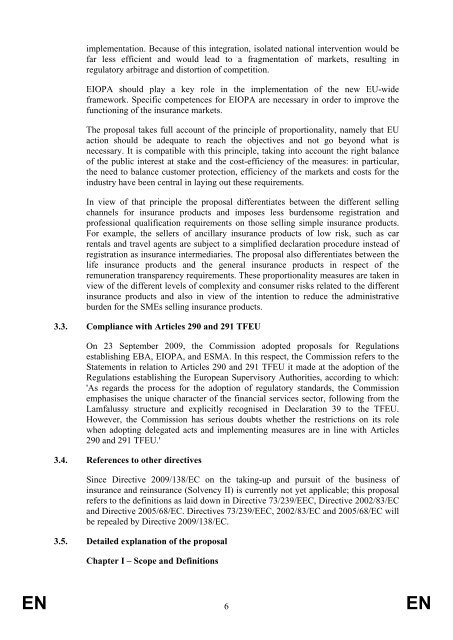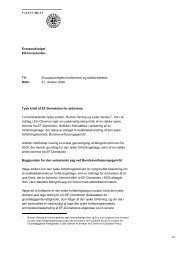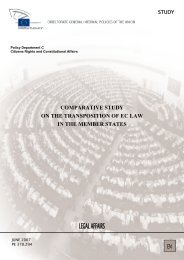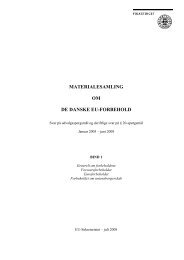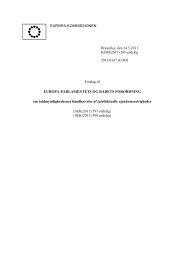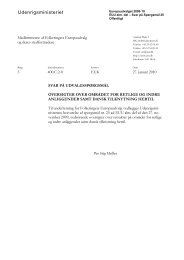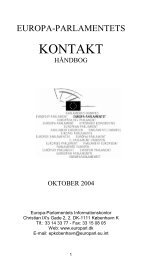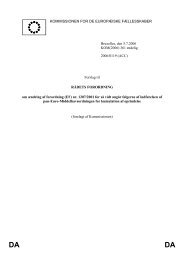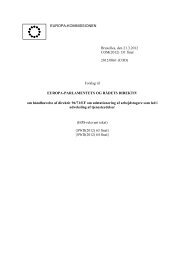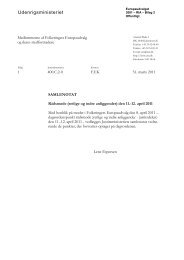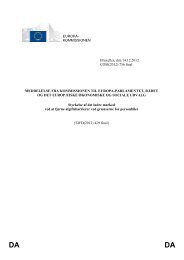EUROPEAN COMMISSION Brussels, XXX COM(2012) 360 ... - BVVM
EUROPEAN COMMISSION Brussels, XXX COM(2012) 360 ... - BVVM
EUROPEAN COMMISSION Brussels, XXX COM(2012) 360 ... - BVVM
Create successful ePaper yourself
Turn your PDF publications into a flip-book with our unique Google optimized e-Paper software.
implementation. Because of this integration, isolated national intervention would be<br />
far less efficient and would lead to a fragmentation of markets, resulting in<br />
regulatory arbitrage and distortion of competition.<br />
EIOPA should play a key role in the implementation of the new EU-wide<br />
framework. Specific competences for EIOPA are necessary in order to improve the<br />
functioning of the insurance markets.<br />
The proposal takes full account of the principle of proportionality, namely that EU<br />
action should be adequate to reach the objectives and not go beyond what is<br />
necessary. It is compatible with this principle, taking into account the right balance<br />
of the public interest at stake and the cost-efficiency of the measures: in particular,<br />
the need to balance customer protection, efficiency of the markets and costs for the<br />
industry have been central in laying out these requirements.<br />
In view of that principle the proposal differentiates between the different selling<br />
channels for insurance products and imposes less burdensome registration and<br />
professional qualification requirements on those selling simple insurance products.<br />
For example, the sellers of ancillary insurance products of low risk, such as car<br />
rentals and travel agents are subject to a simplified declaration procedure instead of<br />
registration as insurance intermediaries. The proposal also differentiates between the<br />
life insurance products and the general insurance products in respect of the<br />
remuneration transparency requirements. These proportionality measures are taken in<br />
view of the different levels of complexity and consumer risks related to the different<br />
insurance products and also in view of the intention to reduce the administrative<br />
burden for the SMEs selling insurance products.<br />
3.3. Compliance with Articles 290 and 291 TFEU<br />
On 23 September 2009, the Commission adopted proposals for Regulations<br />
establishing EBA, EIOPA, and ESMA. In this respect, the Commission refers to the<br />
Statements in relation to Articles 290 and 291 TFEU it made at the adoption of the<br />
Regulations establishing the European Supervisory Authorities, according to which:<br />
'As regards the process for the adoption of regulatory standards, the Commission<br />
emphasises the unique character of the financial services sector, following from the<br />
Lamfalussy structure and explicitly recognised in Declaration 39 to the TFEU.<br />
However, the Commission has serious doubts whether the restrictions on its role<br />
when adopting delegated acts and implementing measures are in line with Articles<br />
290 and 291 TFEU.'<br />
3.4. References to other directives<br />
Since Directive 2009/138/EC on the taking-up and pursuit of the business of<br />
insurance and reinsurance (Solvency II) is currently not yet applicable; this proposal<br />
refers to the definitions as laid down in Directive 73/239/EEC, Directive 2002/83/EC<br />
and Directive 2005/68/EC. Directives 73/239/EEC, 2002/83/EC and 2005/68/EC will<br />
be repealed by Directive 2009/138/EC.<br />
3.5. Detailed explanation of the proposal<br />
Chapter I – Scope and Definitions<br />
EN 6 EN


